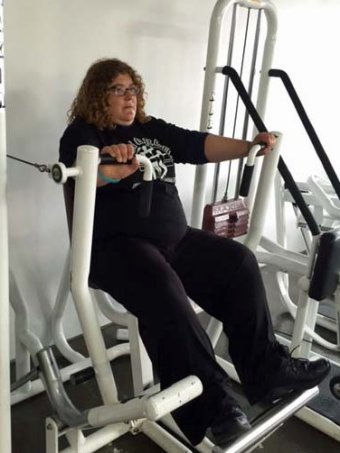
People with severe mental illnesses are dying in their 50s and 60s from preventable diseases, prompting calls for attention to turn to preventing their physical diseases.
Statistics show they are three to four times more likely to develop diabetes and six times more likely to die from heart attack or stroke.
They are also and more likely to die from cancer than suicide.
Like many Australians, Hobart woman Amber Meredith has become a regular at her local gym.
Perhaps unlike most, her recent quest to get fit is motivated by some daunting statistics.
As someone with a severe mental illness, her life expectancy is up to 30 years shorter than the general community.
“I feel frightened, you know, because I’m content with the way my life’s going and I don’t want it to end suddenly” she said.
Connie Digolis from Tasmania’s Mental Health Council wants a new focus on the physical health of the mentally ill.
“It’s terrible to think that someone who has a condition that they haven’t chosen that they are more likely to die from a preventable disease than they are from their initial diagnosis of their mental illness” she said.
“The statistics are fairly damning in the sense of what this means for people with mental illness so were certainly looking at how we can correct that balance.”
Since starting drug therapy about a decade ago for a combination of schizophrenia and bi-polar disorder, Ms Meredith has gained 40 kilos and developed diabetes.
“It’s not very likely at this stage of my mental journey that I would take my own life, but it is much more likely that some of the chronic physical conditions that I’ve got will get worse,” she said.
Push for regular physical check ups
Drug therapies for severe mental illnesses can take their toll on the body and can leave patients feeling tired with an increased appetite.
However, Ms Digolis thinks physical health is also being ignored in many cases as all medical efforts are focussed on improving the mind.
She is pushing for regular physical checks to be part of every care plan once a person is diagnosed with a severe mental illness.
She wants them provided directly to clients in an environment that they feel comfortable and safe in.
Tasmania’s Richmond Fellowship is trying to do something about the issue too.
Chief executive Danny Sutton said new diet and exercise programs for clients have been working well.
“It was amazing how people learnt so much just by having access to better information and support,” he said.
“It can be a challenge I think for them because of the system, so the mental health system sometimes can be separate from the physical health system.”
Ms Meredith is determined to keep up her fight for a longer life but admits it sometimes feels like an uphill battle.
“I’ve recently lost I think about five to 10 kilos in a couple of months at being at the gym and swimming but I need to lose 30 more at least,” she said.
